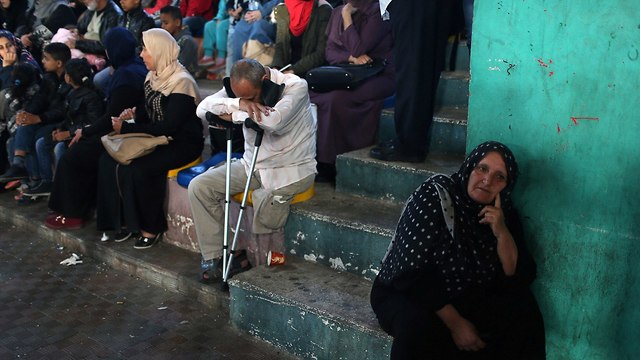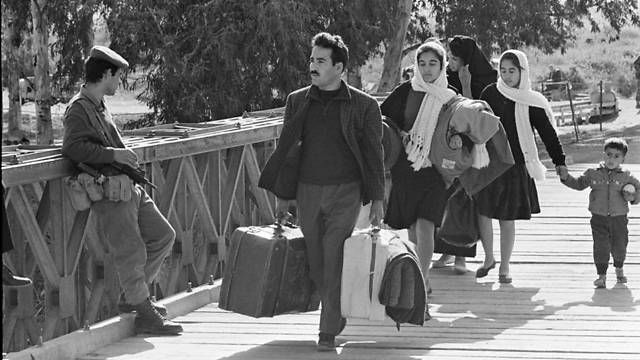

The Palestinian paradox: 70 years of perpetuating refugeeism
Op-ed: The more the international community invested in the refugees of Palestine, and it invested in them more than it invested in any other refugee in the world, the bigger the problem became. In order to do some good to the Middle East, and in order to solve the Israeli-Palestinian conflict, there is a need to drain the conflict’s biggest swamp—the refugee problem.
Well, of course. That’s the result of the “wait and see” policy. Hamas knows it won’t defeat Israel in the battlefield. But it knew in advance that it would defeat Israel in the global public opinion. Hamas wasn’t the only one that knew that. Any sensible person knew that.
Israel should have made the Palestinians in Gaza, including Hamas, an offer they couldn’t refuse a long time ago. I have repeated this claim, I must say, like Cato the Elder.

Now, Hamas is proposing a hudna. The proposal’s precondition, senior Israeli officials responded, doesn’t meet Israel’s demands. Such foolishness. Not only is Israel failing to initiate anything, it is also rejecting a Hamas proposal.
When Hamas propose something, Israel should first of all say yes, and add that the hudna must be based on the international community’s terms. Does Israel have anything to lose? No.
But Israel, once again, is winning on the Gaza border and suffering a defeat in the global media. That’s what Hamas wanted. That’s what Hamas got. And the admission of senior Hamas official Salah Bardawil, that 50 of the Palestinians killed on May 14 were Hamas members, doesn’t help Israel in any way. We have lost this conflict—not because of Hamas, but because of Israeli foolishness.
The only ones perpetuated as refugees
The details of US President Donald Trump’s new peace initiative don’t matter. We already know what the Palestinian reaction will be in advance. Those who rejected Bill Clinton’s proposal, who rejected Ehud Olmert’s proposal and who turned down Barack Obama and John Kerry’s proposal will turn down Trump’s new proposal as well.
The thing is there is no need to give up. In order to do some good to the Middle East, and in order to solve the Israeli-Palestinian conflict, there is a need to drain the conflict’s biggest swamp—the refugee problem.
For 70 years now, the international community has been helping the Palestinians, mainly those who are called—for some reason—refugees. Tens of millions of people became refugees following the dissolution of empires, wars, conflicts and the establishment of nation states. The United Nations created the International Refugee Organization (IRO) in 1947 to deal with the refugees of World War II.
Two years later, in late 1949, the organization’s name was changed to the United Nations High Commissioner for Refugees (UNHCR) to deal with all of the world’s refugees. Well, not exactly all of them. Because five days after the UNHCR’s establishment, another body was created to deal with the refugees of Palestine—the United Nations Relief and Works Agency for Palestine Refugees (UNRWA). Only with them.
Why was there a need for another body? Because the UNHCR was supposed to deal with the integration and rehabilitation of refugees. The Arab states objected. They wanted a body which wouldn’t deal with integration or rehabilitation. They wanted a body that would work to perpetuate the problem. The definition of a refugee was different and broader, the budgets were much bigger, etc. And most importantly, the UNHCR dealt with 50 million refugees—and they aren’t refugees. UNRWA, on the other hand, started off with 711,00, and today the number of registered refugees is 5.3 million. Everything has been reversed.
Since its establishment until today, from 1950 to 1918, the international community has allotted huge sums to UNRWA, which are worth today $40-45 billion. Considering the number of refugees and the size of the families (seven births per woman) when the problem was created, we are talking about $500,000 per family. Even if it were much less, only $250,000, it’s a huge sum.
Considering the purchasing power in the region’s countries, had the international community invested this huge capital in buying an apartment and a car and a farm for each family, a huge sum would have been left for investments in infrastructure, in industry, in welfare and in education. But 70 years of refugeeism are 70 years of perpetuating refugeeism.

For the sake of comparison, the UNHCR, which was created five days before UNRWA, dealt with 50 million refugees, none of whom are refugees today. UNRWA, on the other hand, hit the road with 711,000 refugees and says it is dealing with 5.3 million today.
To understand the paradox, I must add that in late 1950 the UN decided to create another body, the United Nations Korean reconstruction Agency (UNKRA), to handle the reconstruction of Korea, and mainly the refugees—1 to 3 million people who were penniless. This body operated until 1958. Its budget was $148 million (worth about $1.4 billion today). The money donations stopped and the “refugee problem,” like all the refugee problems from the previous decades, disappeared. The transit camps in Israel, which were mainly used to take in the refugees of the Jewish Nakba, operated for several years too, and most of them were emptied out by the late 1950s. The Palestinians are the only ones perpetuated as refugees.
The return fantasy
The amazing paradox is that the more the international community invested in the refugees of Palestine—and it invested in them more than it invested in any other refugee in the world—the bigger the problem became. The Arab world stubbornly refused to rehabilitate the refugees (as detailed in Einat Wilf and Adi Schwartz’s book “The War for the Right of Return,” which was published this week). The stubbornness was only and exclusively about the perpetuation of refugeeism.
The Center for Near East Policy Research keeps exposing what is taking place behind the walls of UNRWA schools, and especially the brainwashing concerning the “right of return.” There is no such right. Tens of millions of people became refugees those years. None of them received a “right of return.” There were occasionally claims from expelled and uprooted people in Europe, who demanded the restitution of property and a return.
The European Court of Human Rights discussed the most important claim in this area. Refugees from the Turkish side of Greece, following the Turkish invasion in 1974, demanded a restitution of property. The situation has changed, the court ruled, and dismissed the claim.
There were other claims. Jews claimed property that was expropriated from them in Egypt. In practice, no one received compensation. But the refugees from Palestine, who were Arabs at the time and later became Palestinians, keep fostering just one fantasy: A return.
Dissolving UNRWA
To somehow solve the Israeli-Palestinian conflict, there is a need for a different route based on the following principle: No more perpetuation of refugeeism, but rather a rehabilitation of refugees. There is no need to terminate UNRWA right away. And anyway, most of those registered by UNRWA are no longer in refugee camps or don’t even exist (only 177,000 of the 450,000 people registered in Lebanon are actually in Lebanon). Many others are Jordanian citizens or residents of the Palestinian Authority, and others have moved to Europe with hundreds of thousands of refugees from Syria. The remaining ones should be handled by the UNHCR.
Trump’s peace plan will fail just like all previous plans, but the American administration can change direction regarding the refugees. This is a historic opportunity, because some Arab states have changed their stance. And dissolving UNRWA, which was impossible in the past, is becoming more possible today. It’s good for the Palestinians, to wean them off their fantasies, it’s good for the Middle East, it’s good for Israel and it will only raise the chances of peace.

















